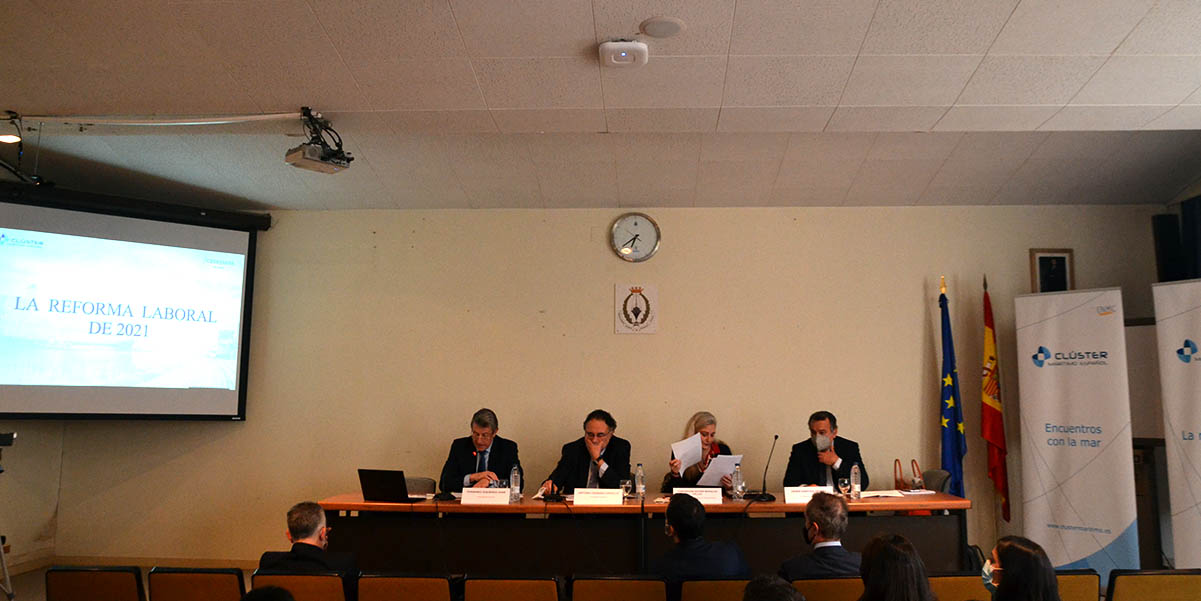The Labor Reform poses a paradigm shift

On March 29, the Cluster Marítimo Español held the first face-to-face Meeting with the Sea after the pandemic, in which the 2021 Labor Reform was the protagonist, with the Madrid law firm JL Casajuana Abogados, and more specifically its Labor department, attending as guests. The act was attended by the two heads of the office, and was attended by representatives of both the Navy and different very important companies associated with the Cluster such as Navantia or Trasmediterránea or the employers’ association ANAVE itself. Likewise, the Meeting could be followed electronically.
Thus, in a round table moderated by Fernando Izquierdo, technical director of the CME, the different novelties and controversies raised by the new Labor Reform approved at the end of last year were examined 2021.
In this sense, the discussion table began with the intervention of Antonio Cebrián Carrillo, director of the labor department of JL Casajuana, who put this statement into context new Reform, highlighting the most important points that had been affected by the previous law. A rule that, according to Cebrián, probably has the virtue of not having left anyone happy.
“I think that, after so long, perhaps a golden opportunity to make a real reform of the labor market of the 21st century has been lost.”
In the case of this Reform, some very important aspects have been addressed, such as the issue of temporary hiring and the reform of the Article 15 of the Workers’ Statute.
“From Europe we were being required to reduce temporary employment rates, in order to obtain results for the active population in Spain similar to the European average. The test of the success of this reform is going to be if, indeed, it has been achieved or not the reduction of those rates of temporality that we had in Spain and that are a significant ballast”.
On the other hand, a new eventual contract was created, which affects, among others, companies that work with contractors and subcontractors. In this sense, a limitation has been established by which this figure cannot be used in this case, unless there are circumstances, highly valued, that justify the eventuality.
The figure of the fixed discontinuous contract, which until now was not sufficiently used, has also been revised. The intention of this legislation is to move towards that figure of the fixed contract.
Another aspect to highlight is everything related to subcontracting. Thus, one of the claims that the legislators from the union side had was to attack this norm because they understood that, as it was, situations of salary reduction of the workers of the contractor or subcontractor companies could occur.
In 2021, article 42 states that contractors and subcontractors will be subject to the same collective agreement as the company or sector of the company for which they are going to provide activity. With two exceptions. The first is if a contracting company has a recognized sector agreement, the agreement of that sector of that company will be applied to that company. The second is that the contracting or subcontracting company’s own agreement, if it has one, will be allowed to apply, but respecting the primacy of the sectoral agreement in salary matters.
Another of the fundamental matters that this Reform has touched is the one related to the application priority of the company agreement over the sector agreement that established the reform of 2012, which even affected the matter of remuneration and salary supplements. In this sense, the part related to salary and salary supplements has been eliminated, because the rest of the company collective agreement continues to be of preferential application compared to that of the sector.
Similarly, Cebrián has made reference to the creation of the RED crisis mechanism, in which it is intended to replace ERES with ERTES, with commitments to training to obtain bonuses in the contribution. There are no layoffs, but conditions are modified, and if possible, due to a reduction in working hours. And the experience of the ERTEs at the time of the pandemic has also been used for a new regulation of the matter. And it has been clarified, which is very important, that the employment safeguard is per worker, not for the group of those affected by the ERTE.
Cebrián has highlighted that the matter that has truly meant a change of course in the 2012 reform is the new regulation of the ultraactivity of collective agreements that it had been rendered ineffective after a year without a new agreed text, and this is no longer possible. It is true that he is obliged to seek means of out-of-court conflict resolution -mediation and even arbitration- in the event that the negotiation runs aground.
Finally, he alluded to the increase in penalties for companies in cases of breaches of contracting rules, so that the the classification as a serious misdemeanor, although individualization is established in the offense per affected worker, with sanctions that can reach a maximum of 10,000 euros. A clear warning to sailors since this new regulation can bring very serious consequences.
Next, Javier Sánchez Toledo, senior lawyer, expert in labor law and member of the JL Casajuana team, took the floor, who was in charge of explaining the most important aspects of the Reform 2021 Labor in terms of recruitment.
In this sense, he mentioned the modification of the eventual contract , maintaining temporary contracts, even extending them, despite attempts to limit them. < /p>
Within this type of contract, Sánchez Toledo listed three. The first of them is the one that provides for the occasional and unpredictable increase. In this type of contract, seasonality causes are excluded, with which, the causes that favor this contracting are very limited. The duration of this contract is 6 months, extendable to 12 by sectoral agreement, and in which an extension is possible. In addition, the replacement of annual vacations is included. If it was already necessary before, now it is even more necessary to specify the cause of the contract in the contracts.
The second of these contracts is the circumstances of production by occasional or foreseeable substitution, which establishes a duration of 90 days in a calendar year.
The third is the already existing contract to replace the worker with the right to reserve a job, the formerly called interim contract. This contract offers the novelty that it can be done up to 15 days before the leave or the situation that prevents the worker from providing his services and can be replaced.
“Indeed, the limit with seasonality, especially the first two, is certainly narrow and it will be very difficult to distinguish which jobs are seasonal”, Javier Sánchez indicated.
On the other hand, he made reference to the disappearance of a historical contract in our legal system: the contract for specific works and services. However, this contract is allowed in the artistic sector, for example.
Continuing in his presentation, he made special mention of the permanent discontinuous contract , which is linked to the performance of seasonal work or seasonal productive activities . Intermittent service jobs that have certain, determined or indeterminate execution periods are also regulated. It replaces, in a certain way, permanent part-time contracts.
In this type of contract, the appeal is especially relevant, which, unlike the previous Reform in which the seniority criterion was taken into account, is regulated by collective agreement or company agreement. In said convention or agreement, the formal or objective criteria must be established by which the appeal must be governed.
“Here we can find ourselves with a somewhat controversial situation. These are those companies that do not have their own agreement or that the sectoral agreement that applies to them is not regulated in the appeals, or that do not have legal representation of the workers. For these cases, it is understood that an ad hoc commission can be created that can negotiate these criteria with the company”, explains Sánchez Toledo.
Finally, the representative of JL Casajuana referred to training contracts, which are divided into alternate and professional practice contracts.
And he pointed out that, precisely because of the date the day was held, all these modalities were fully applicable as of the following day, the legislator having established a transitional period both for the contracts in force at the entry into force of the royal decree law on December 31, as well as for those that could be concluded, in accordance with the “provisional” legislation during the three months of “vacatio legis” for this matter.
The Labor Reform from the interpreter of the norm
From the judge’s side, Concepción Esther Morales Vállez, magistrate of the Social Chamber of the Superior Court of Justice of Madrid, showed her vision, different and her own, of the Labor Reform of 2021.
“I like this Labor Reform, I like the ideas it tries to convey. What I don’t like is how the legislator has transferred the ideas. The ideas were good, the goals too; but when the legislator has embodied them in the norm, he has not done it correctly. This reform is going to give lawyers a lot of work.”
As the magistrate explained, we are witnessing a paradigm shift, hence the title of our review, in which we are moving from a temporary contract excessive to a reduction of the same, in favor of an indefinite contract.
Like her fellow debater, Concepción Morales, she mentioned the discontinuous permanent contract, of which she highlighted the importance of the calling criteria that must be taken into account account.
“In the past, the calling criteria for intermittent permanent staff were based on seniority. Now, these criteria will have to be agreed with the negotiating parties of the collective agreement or, failing that, by means of a company agreement. When I talk about criteria, what raises many doubts for businessmen is how they are going to manage it. In my opinion, I think it will have to be managed as a bag of hours.”
For Morales, the strengthening of the discontinuous permanent contract will solve all those problems of chained fixed-term contracts.
“We have to change all our paradigms and I think that what the labor reform is trying to do is that. Our Supreme Court has finally realized that either we make a paradigm shift in our labor market, or we have a very important competitiveness problem with the rest of the European Union.”
He appealed to the problem of youth and the possibility of starting a certain life project, which with the existing temporary contracting model, with the abuse of chaining contracts, could turn into a real chimera.
In addition, she wanted to highlight the importance of beginning to promote a Spain that can work on its own and does not need the help of third parties.
“We must strengthen the Spanish business fabric, because, if not, with so much help and socialization of spending that we are going to have with these measures that the Government has just approved, the sustainability of the financial system could be called into question.”
An interesting debate followed, with questions addressed to both Mrs. Morales Vállez and the lawyer Sánchez Toledo.
05/04/2021




















